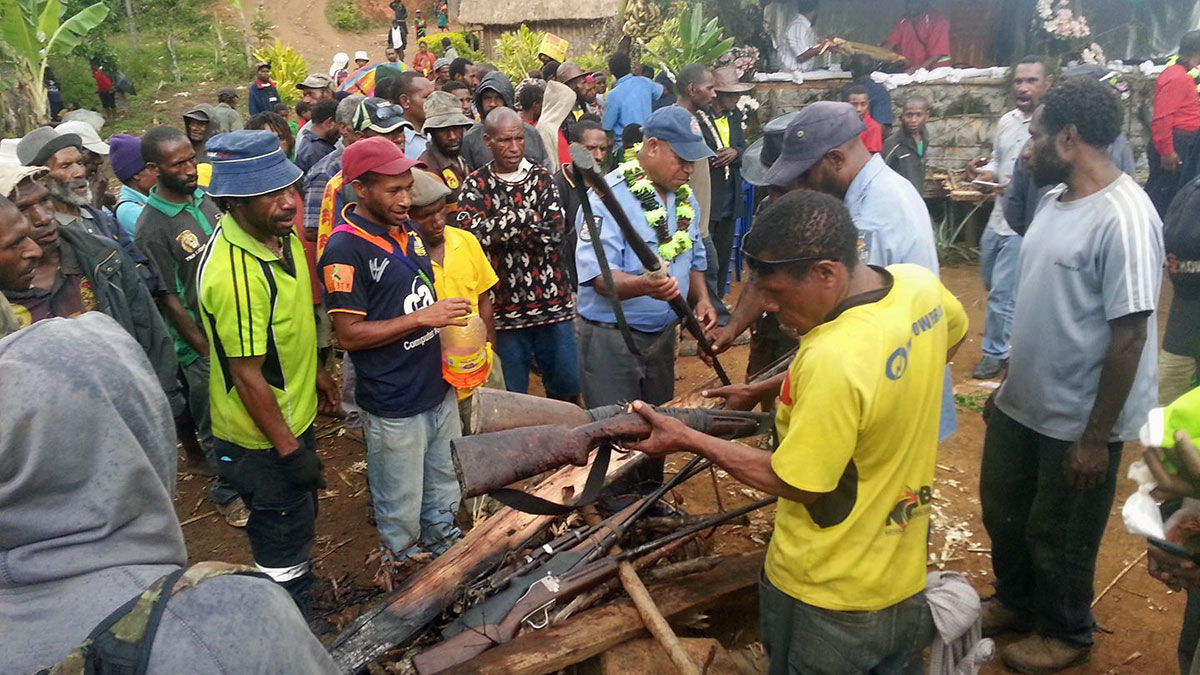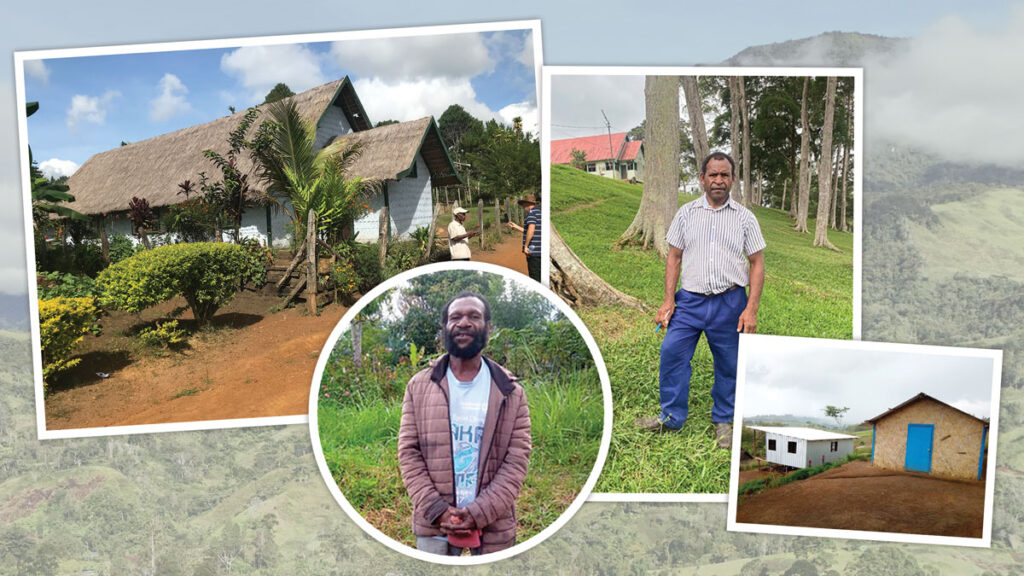Come with me. Close your eyes for a moment. Imagine that we are standing together in a broad, misty valley. Feel the cool air brush against your skin. Let your eyes linger on the evergreen grasses and trees. Allow yourself to wonder if the Garden of Eden could have been as beautiful as this.
And steady yourself as you descend, wide-eyed, to the site of a burning village.
The air is filled with smoke, rising languidly above mounds of black ash. Women and children hide in the forest, terrified of those who have stripped their fields and herded away their pigs. In the distance, a decrepit school stands idly, empty of laughter or the sounds of teachers scolding students. A small church, recently filled with sounds of song and praise, is the only building that is untouched.
Over a ridge, a widow watches a sweet potato roasting on a bed of glowing ash. She is worried. Her hands tremble. Recently a man in her clan died after a long illness. Some of the relatives are saying she is responsible. They whisper and huddle together. A witch, one said. A sorcerer. A Dracula. For that is the new word they use for the likes of her. She has done nothing but fears what will happen when the relatives of the deceased man return to her house. She is still grieving, for her own husband died two years ago and a daughter died recently in childbirth. It was too dangerous to go to hospital.
This was the recent, harsh reality of life for the 3000 people of the Guna-Goreku tribe in Papua New Guinea’s rugged and beautiful Simbu Province. According to Pastor Benjamin Kola and his wife, Dr Agnes Kola, few Guna-Goreku people had gone to school because of constant fighting over a period of more than 25 years. Many had no adequate home—because it doesn’t make sense to improve your house when it can be burned down or the roofing iron stolen. Women and children had been abused and neglected, young men were addicted to marijuana or home brew. Illegal weapons ownership had flourished and homemade shotguns provided an ever-present danger. Even voting had not been possible because men with guns decided who was voted for. It’s called block voting. Those who could, had left for an education or drifted off to an uncertain future in the cities of Goroka, Lae and Port Moresby. Despite its seven churches, and having descended from one man, the Guna-Goreku tribe was divided. Educated members of the community, spread across Papua New Guinea, feared returning.
All this was until the Kolas returned from studying in the Philippines. According to Pastor Benjamin and Dr Agnes, the Lord gave them a dream. A dream to mobilise all the community leaders, educated elites of the community, youths, men, women and children. A dream to bring together all the church pastors—Lutheran, Church of Christ, Catholic, Lutheran Revival, Evangelical Brotherhood of Christ, New Tribes Mission and Seventh-day Adventist. A dream to bring peace to a broken and aching community suffering from decades of hopeless violence. A dream to place God at the heart of a reconciliation and peace process that would restore hope.

The result has been nothing short of remarkable. Since 2015, a slow but profound transformation has occurred as educated members of the community have prayed together, met together and planned together.
With much prayer, church and clan leaders gathered to talk about reconciliation and peace. Months passed while six stages were decided on. First, there would be reconciliation between husbands, wives and children as the foundational step. Peace, the community decided, starts in the home. Then, families within the same clan were asked to reconcile with one another over disagreements and issues like land and politics. Following reconciliation within clans, six clans reconciled with one another—pledging to cease all fighting.
Tangible actions and events became central to the peace process. Four cows were killed, cooked and eaten with the community sitting together in peace. A Memorandum of Understanding was signed with the police and government. Public surrender of weapons and drugs followed. Smashing of home-brew equipment and the burning of firearms took place. Weapons of terror were reduced to ash, publicly, at the cost of owners who had come to acknowledge a greater gain.

Finally, the death of a goat symbolised taking away past sins and atonement. With respect to traditional practices, six stones were buried in the ground, representing a new covenant with God. Six sugar canes were broken in half and six tanget trees planted. All this bound together a community seeking a new future. Together. With Jesus at the centre of strong families and a safe community.
In partnership with other church and clan leaders, and with the support of the Adventist Development and Relief Agency (ADRA), work continues to heal and empower the Guna-Goreku people.
There have been setbacks. The road has not been easy. But incredibly, the peace has held.
This year, for the first time, 174 female and 122 male students are enrolled in Kebil Primary School. Six adult literacy classes meet in churches and open-air meeting places. A new high school is being built. The community has constructed a 5.5-kilometre road linking all six clans of the Guna-Goreku community while community police patrol the hamlets. And the good news doesn’t stop there. An aid post has been established nearby. And Pastor Benjamin is heading up an ambitious bulb onion agriculture project to create income. It sounds like a small thing, but people have begun to plant flowers again. Like the flowers, community is blossoming.

Featured on national TV, the Guna-Goreku Stretim Hauslain Association is attracting international attention in a nation known for devastating tribal fighting. And faith, it seems, is key to change. Dr Agnes reports that, for the first time in many years, women are being given a voice in community decision-making. Her husband has personally intervened to prevent harm to women accused of sorcery.
There are many powerful stories of change. Interviewed on national TV, one grandmother said she was old and not fit for school, but explained, “I also wanted to read my Bible so I joined them . . . I’m happy to go and learn with the children. The teacher taught me sounds and ABCs. I am so excited to go to school. I am old but my mind is like a child excited to go to school.” And then, in halting English, she begins reading from her Bible, “Ask, and it shall be given you; seek, and ye shall find . . .”
I can almost hear Pastor Benjamin, Dr Agnes and the community leaders from different faith backgrounds finishing that beautiful Bible promise with her. “. . . knock, and it shall be opened unto you” (Matthew 7:7).
Dr Brad Watson lectures at Avondale College of Higher Education and works closely with ADRA. Married to Fiona, he has authored three books for teens: Finding David, David’s Revenge and David’s Triumph. Visit absentmindedprofessor.avondale.edu.au.






